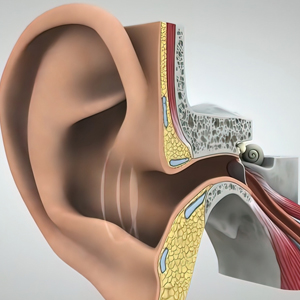AUDITORY PROCESSING TEST

What is an Auditory Processing Disorder?
Auditory processing disorder (APD) is a condition, generally affecting school-aged children where despite normal hearing, the kid can’t understand what they hear in the same way other kids do. In a very simplistic way, it is potentially due to lack of coordination between ears and auditory processing pathways in the brain.
Auditory processing disorder symptoms are exacerbated in a poor listening situation, such as in large halls where there is reverberation, trouble understanding in background noises such as a classroom, playground, sports event, school cafeteria, or party.
What are the Signs and Symptoms?
Auditory processing disorder symptoms can range from mild to severe and often include:
- Difficulties understanding speech in the presence of background noise
- Difficulties in following multi-step commands through listening.
- Easily distracted by loud or spontaneous sounds
- Difficulty remembering information presented verbally.
Auditory processing disorder (APD) is often misunderstood because many of its symptoms have similarities to conditions related to speech-language disorders, dyslexia, attention deficit hyperactivity disorder (ADHD) however a thorough assessment can establish the problem area so that appropriate management can be planned.
How is Auditory processing disorder (APD) diagnosed?
If you think your child is having trouble hearing or understanding, hearing assessment is the first step to rule out any hearing loss.
Once the audiologist has determined no underlying hearing loss or middle ear condition, an auditory processing test battery is administered. The test battery includes a series of listening tasks which identify different attributes of listening capabilities and reflect functional acuity of different elements of the auditory pathway.
Some of the tests include auditory figure-ground tests, auditory closure tests, dichotic listening tests and temporal listening tests. The audiologists may also perform some electrophysiological tests in conjunction with the listening tests.
Generally, Auditory processing disorder (APD) testing is conducted for a child over 6 years of age, to ensure that child is able to comprehend the tasks as well as to ensure that auditory pathways are well established.
Often the kids diagnosed with Auditory processing disorder (APD) can develop better auditory skills over time as their auditory pathway matures and therefore adequate training in areas of deficit plays a crucial role to overcome the challenges brought upon by the auditory processing issues. These are generally discussed with the parents and teachers and may often involve other professionals such as speech language pathologists.
The audiologist also plays an important role to discuss strategies to overcome the listening barriers which allows better access to spoken speech. The audiologist may also discuss use of assistive listening devices (ALD) such as a frequency modulation (FM) system. This assistive listening device emphasizes a speaker’s voice over background noise, making the voice clearer so a child can understand it. The person talking, such as the classroom teacher, wears a tiny microphone transmitter, which sends a signal to a wireless receiver that the child wears on the ear or to a speaker box.
Additionally, there are several computer-assisted programs which are available for training as well as resources to help kids with auditory processing disorder symptoms
What causes auditory processing disorder?
Auditory processing disorder has no one cause; however, it is connected to risk factors such as:
- Ear infections that last a long time
- History of premature and/or traumatic births
- Epilepsy/seizure disorder
- Trauma to the head
- Poisoning with lead
- Stroke
- Meningitis
How is it Treated?
Auditory processing disorder in adults and children is often best managed by a multidisciplinary team of professionals, which may include audiologists, speech-language pathologists, psychologists, and teachers, to evaluate and treat hearing, language, cognitive, and academic concerns.
Although Auditory processing disorder treatment is primarily decided by the underlying cause, a range of therapeutic options may be prescribed. Assistive listening devices, auditory training, and unique listening tactics are examples of these approaches. Audiologists often give treatment options, though physicians, speech-language pathologists, psychologists, teachers, and other professions may be engaged.
Tests for auditory processing disorder (APD)
A child’s auditory processing issues are frequently discovered by their parent or school teacher, and a referral to audiology can be placed by the child’s pediatrician to begin the examination process. When a referral is received, a team of audiologists carefully collects and reviews information about the child to evaluate if the youngster fits the testing standards.
Because of the complexities of auditory processing disorder (APD), multiple variables are REQUIRED for a child to be eligible for testing.
A child should:
- Be at least 6-7 years old.
- Have normal hearing, speech, and language abilities
- Have normal (or almost normal) hearing thresholds.
Furthermore, some co-occurring illnesses prevent a youngster from qualifying for testing.
Common causes for a child’s ineligibility for auditory processing disorder APD testing include:
- Autistic Spectrum Disorder (ASD)
- Delay or abnormality in development
- Intellectual impairment or a low IQ
- Significant speech/language difficulties, such as apraxia, stuttering, and so on.
- Any type or degree of hearing loss
Because auditory processing disorder (APD) is comparable to other conditions, evaluating whether a kid is suitable for testing necessitates a thorough examination of the child’s medical, educational, and developmental background.
This examination might run up to two hours and demands the child’s undivided attention and effort. The findings of each test are collated and analyzed to determine whether APD is the proper diagnosis.
APD Treatment and Management
Treatment options vary, but may include one or more of the following:
- Changing your environment, such as where you sit in meetings, in a school, or at work. If you have APD, you might find it helpful to encourage individuals to speak more slowly or to provide written instructions.
- Receiving specialist speech therapy aimed at improving auditory abilities.
- Using coping skills such as a recording device to record communication or requesting more information.
- Using other managerial techniques to assist your brain in focusing on the audio signal.
Management:
Self-care for auditory processing disorder begins with understanding how APD may affect you. Certainly, APD impairs your capacity to comprehend what you hear. It may also have an impact on your self-esteem and confidence. Having said that, taking measures to improve your ability to interpret what you hear might help you feel more confident.
Book an Appointment
Auditory Processing Disorder Test
To book an appointment for APD Test, fill in your details.
Contact us
- 0493 493 485
Fill in your Details
FAQ'S
Auditory Processing Disorder is a hearing disorder that disrupts how an individual’s brain understands what they are hearing.
Some of the most frequently reported symptoms of APD include:
- Significant difficulty understanding speech, especially in the presence of background noise.
- Difficulty following multi-step directions that are presented verbally, without visual cues.
- Easily distracted by loud or spontaneous (sudden) sounds.
Yes, there are auditory processing tests made specifically for adults. These tests assess an adult’s ability to accurately and efficiently interpret auditory information. They may include activities like speech-in-noise testing, temporal processing evaluations, and auditory pattern identification. The findings of these tests aid in identifying any auditory processing deficiencies and guiding appropriate management options.
Teachers also can help students with APD by:
- using strategic (or preferential) seating so the child is closest to the teacher. This reduces sound and sight distractions and improves access to speech.
- pre-teaching new or unfamiliar words.
- using visual aids.
- recording lessons for later review.
Auditory Processing Disorder can make it difficult to follow what is being spoken in challenging environments such as in background noise, which is common in classrooms. It tends to inhibit phonemic awareness, making it hard for students to identify the isolated sounds in language. Recognizing and creating rhymes can be challenging as a result. This can lead to reading and spelling difficulty.
Because the auditory process matures fully by 13 years, it is possible that your child may grow out of it once they reach that age. Listening skills usually develop as the auditory system matures. It usually takes around 12-15 years of age to have complete auditory processing maturity.
